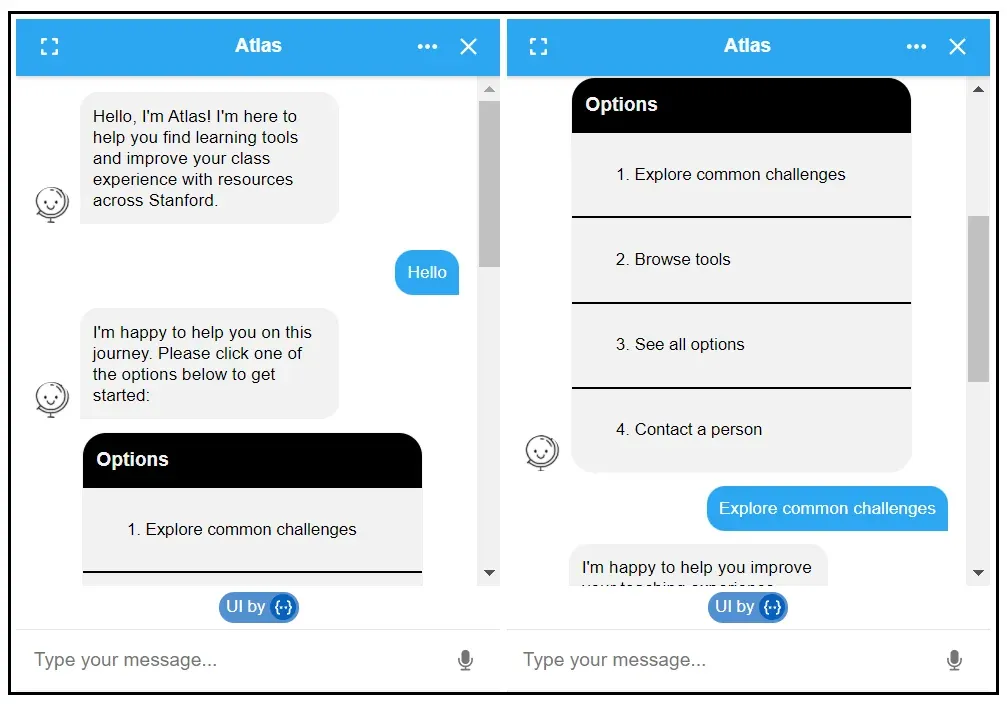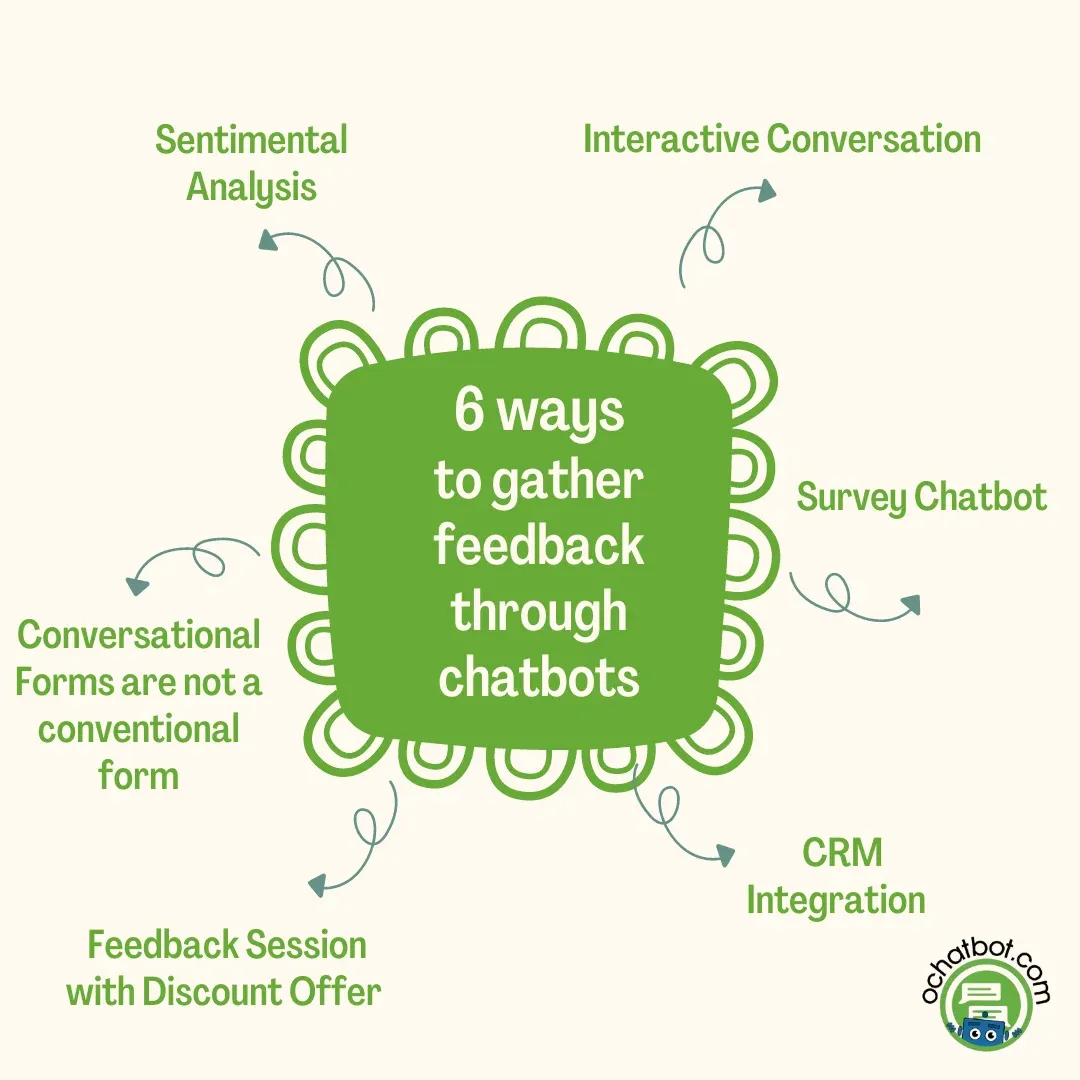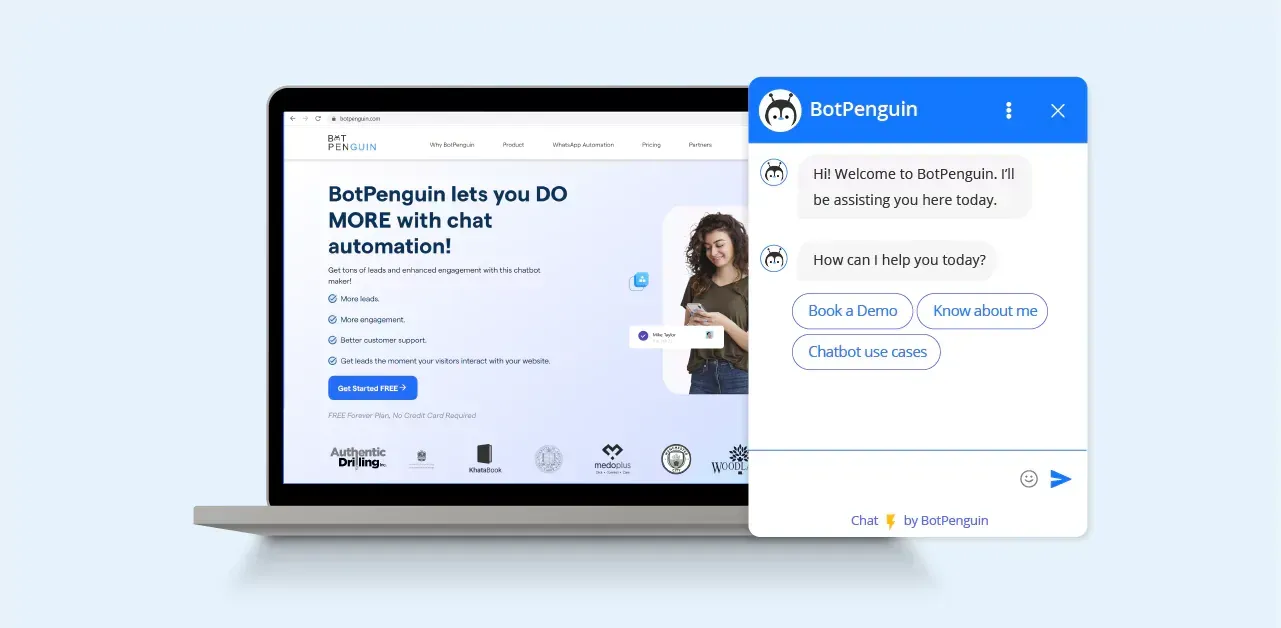“Your feedback is important to us..." is a recurring theme among business feedback tools, but what's the point if a client can't communicate what they want, especially if it can't be captured in a 10-5 score?
Chatbots can strengthen consumer relationships and deliver better business data by establishing a stronger feedback loop.
Customer feedback can assist internet business owners in understanding how to build their businesses to cater to their target audience.
Customers' feedback is collected in a variety of methods by online business owners. Conventional feedback forms only sometimes assist e-commerce site operators in gathering accurate feedback from online buyers.
Input data from chatbots assists e-commerce site owners in collecting input and developing their business around the target demographic.
According to a recent study by Drift, businesses that use chatbots to collect customer feedback see a 15% increase in customer satisfaction.
This blog focuses on how e-commerce site owners can benefit from client feedback collection and several methods for a chatbot to collect feedback.
Understanding the Role of Chatbots in Feedback Collection

To fully appreciate the value of chatbots in feedback collection, let's explore their capabilities, compare them to other methods, and highlight their advantages.
Explanation of Chatbots and Their Capabilities
Chatbots are AI-powered virtual assistants that can engage in human-like conversations with users.
They can be integrated into messaging platforms, websites, or mobile apps, making them accessible to customers across various channels.
By leveraging natural language processing and machine learning algorithms, chatbots can understand user queries, provide information, and complete tasks in real time.
Comparison with Other Feedback Collection Methods
Unlike traditional methods such as surveys or email questionnaires, chatbots provide a more conversational and interactive approach to feedback collection.
While surveys often have low response rates and are perceived as impersonal, chatbots offer a seamless experience that feels like a genuine conversation.
This encourages customers to provide feedback and allows for more detailed, contextual, and actionable responses.
Benefits of Using Chatbots for Collecting Customer Feedback
The advantages of using chatbots for collecting customer feedback are vast and impactful.
- Chatbots are available around the clock, allowing businesses to collect real-time feedback and address issues promptly.
- Chatbots' interactive and conversational nature tends to get more responses than traditional methods, resulting in more thorough and representative feedback.
- Chatbots can customize interactions based on individual customer data, creating a personalized and contextually relevant feedback collection experience.
Planning Your Feedback Collection Strategy

Now that we understand the power of chatbots in feedback collection let's delve into planning an effective strategy.
Defining Your Objectives and Target Audience for Feedback Collection
It's crucial to clearly define your objectives and the type of feedback you aim to collect.
This could include understanding customer satisfaction, identifying product improvement areas, or gathering insights for new feature development.
Additionally, identify your target audience to ensure the feedback collection process is tailored to their needs and preferences.
Identifying Key Touchpoints for Engaging Customers with Chatbots
Identify the touchpoints along the customer journey where chatbots can effectively engage with customers.
This could be during the purchasing process, customer support interactions, or post-purchase follow-ups.
Businesses can seamlessly collect feedback without disrupting the customer experience by strategically placing chatbots at these touchpoints.
Suggested Reading:
Designing Chatbot Conversations for Feedback Collection

Chatbots have become increasingly popular as a means of collecting feedback from customers.
With their ability to provide a conversational and interactive experience, chatbots offer a unique opportunity to gather valuable user insights.
This section will explore the art of designing chatbot conversations specifically for feedback collection.
Crafting Conversational Flows and Questions
When designing chatbot conversations for feedback collection, it's important to balance engaging and obtaining actionable feedback.
One way to achieve this is by crafting conversational flows that mimic a real human conversation. Using a friendly and approachable tone, the chatbot can put users at ease and encourage them to provide honest feedback.
In addition, using different question types can help gather specific feedback.
Open-ended questions allow users to express their thoughts in their own words, while multiple-choice questions provide structured feedback that can be easily analyzed.
Chatbots can collect qualitative and quantitative feedback by incorporating a mix of question types.
Leveraging AI for Natural Language Processing
To truly understand and interpret customer responses, chatbots need to leverage the power of artificial intelligence (AI) and natural language processing (NLP).
NLP allows chatbots to analyze and interpret user input, enabling more accurate and meaningful interactions.
Integrating Natural Language Processing Capabilities
Businesses can use advanced language understanding algorithms by integrating NLP capabilities into chatbots.
These algorithms can help chatbots recognize and process user intents, entities, and sentiments. This allows chatbots to provide personalized responses and gather feedback more effectively.
NLP can also be used to perform sentiment analysis on user responses.
By understanding the sentiment behind users' feedback, businesses can gain valuable insights into customer satisfaction and identify areas for improvement.
Also with the advent of Natural Language Processing and generative AI, chatbots have become capable of generating responses that are similar to humans. And that is where BotPenguin steps in.
With advanced AI capabilities and native integration with ChatGPT, BotPenguin allows users to create a no-code AI chatbot that can conversate like humans for various platforms like:

Promoting Chatbot Engagement for Feedback Collection
To ensure the success of chatbot-based feedback collection, it is important to design chatbot experiences that are both compelling and engaging.
This section will explore strategies for promoting chatbot engagement and increasing participation in feedback collection.
Designing Compelling Chatbot Experiences
A key factor in encouraging feedback participation is designing engaging and user-friendly chatbot experiences.
By utilizing conversational design principles, businesses can create chatbot interactions that feel natural and enjoyable.
This includes using clear and concise language, providing helpful prompts, and avoiding jargon or technical terms.
Additionally, visual elements such as emojis, gifs, and images can be incorporated to add a playful and interactive touch to the chatbot experience.
These elements make the conversation more engaging and help capture the attention and interest of users.
Utilizing Incentives and Gamification Elements
Incentivizing feedback participation can be a powerful motivator for users. Businesses can offer rewards such as discounts, exclusive offers, or loyalty points in exchange for providing feedback.
This encourages users to share their opinions and helps build customer loyalty and increase engagement.
Another effective strategy is to incorporate gamification elements into the chatbot experience.
For example, businesses can introduce quizzes, challenges, or mini-games that users can participate in while providing feedback.
This adds an element of fun and competition, making the feedback collection process more enjoyable and appealing.
Examples of Successful Chatbot Engagement for Feedback Collection
Several businesses have successfully implemented strategies to promote chatbot engagement for feedback collection.
For instance, a mobile app company used gamification elements in their chatbot to collect user feedback on new features. Users who provided feedback were entered into a monthly prize draw, incentivizing participation and increasing engagement.
Similarly, a fashion retailer implemented a chatbot that offered personalized style recommendations and collected feedback on outfit suggestions.
Users who provided feedback received exclusive discount codes, creating a win-win situation for the business and the customers.
Suggested Reading:
Analyzing and Interpreting Customer Feedback with Chatbots

Customer Feedback with Chatbots is a goldmine of valuable business insights. However, it's crucial to utilize AI-powered analytics to extract meaningful information from feedback data.
These advanced tools can help analyze and interpret feedback data in a way that would be impossible for humans to achieve independently.
Utilizing AI-powered analytics
AI-powered analytics tools can sift through large volumes of feedback data, identify patterns and trends, and extract valuable insights.
These tools use natural language processing (NLP) to understand the meaning behind Customer Feedback with Chatbots, including their sentiments, intents, and opinions.
By analyzing this data, businesses can gain a deep understanding of customer preferences, pain points, and areas for improvement.
Extracting insights from customer sentiments and trends
One of the key benefits of AI-powered analytics is the ability to analyze customer sentiment. Sentiment analysis can determine whether feedback is positive, negative, or neutral, enabling businesses to gauge customer satisfaction.
By tracking sentiment trends over time, businesses can spot and proactively address emerging issues.
Another aspect of feedback analysis is identifying emerging trends. Businesses can identify common themes and trends among their customers by analyzing large volumes of feedback.
This can provide valuable insights into new product ideas, service improvements, and market trends.
Integrating Feedback with Business Processes
Integrating feedback with key business processes is important to derive value from feedback. This involves incorporating feedback data into customer relationship management (CRM) systems, databases, and other relevant software platforms.
By doing so, businesses can ensure that feedback insights are accessible to the right departments and can be acted upon effectively.
Integrating feedback data with CRM systems and databases
Integrating feedback data with CRM systems and databases gives businesses a 360-degree view of their customers.
Businesses can better understand individual customer preferences and history by linking feedback data to customer profiles. This enables personalized responses and actions based on the feedback received.
Additionally, integrating feedback data into these systems allows easy tracking and follow-up. It becomes easier to categorize feedback, assign ownership, and track progress on resolving customer issues.
This integration ensures that no feedback falls through the cracks and that every customer concern is addressed promptly.
Distributing feedback insights to relevant departments
More is needed to collect feedback and reach the right people within the organization. Integrating feedback processes with relevant departments ensures that feedback insights are distributed to those who can take action.
For example, feedback regarding product features should reach the product development team, while feedback about customer service should be shared with the support team.
By distributing feedback insights to relevant departments, businesses enable effective collaboration and encourage a customer-centric approach across the organization.
This integration helps bridge the gap between the customer and internal teams, improving processes and customer experiences.
Conclusion
Why not use the latest innovations to streamline your client service? AI chatbots assist internet business owners in understanding their target audience by automating many tedious activities.
Chatbots thrive in automating difficult operations in the e-commerce industry and collecting client feedback. Implement the best chatbot for your online businesses and update your e-commerce store with the latest technologies.
The advantages of utilizing a chatbot for assisting online customers are widely acknowledged. For instance,
- Chatbots are available around the clock.
- They can assist multiple users simultaneously.
- Chatbots alleviate the monotony experienced by customer service agents.
- Numerous methods can enhance the chatbot experience and personalize the interaction to gather valuable feedback and insights, and Verloop.io excels in all of these aspects.
So, why wait? Schedule a demo with our experts and optimize Botpenguin's chatbots to create and deploy chatbots capable of engaging in meaningful conversations across various channels and at scale efficiently.
Suggested Reading:
Frequently Asked Questions (FAQs)
How can chatbots be used to collect customer feedback?
Chatbots can collect customer feedback by engaging in conversational interactions and asking specific questions. They can be programmed to prompt users for feedback at various touchpoints or through proactive outreach.
What are the advantages of using chatbots for feedback collection?
Using chatbots for feedback collection offers advantages such as 24/7 availability, scalability for large volumes of feedback, cost-effectiveness, and the ability to provide personalized responses.
Can chatbots analyze and interpret customer feedback?
Chatbots can be equipped with AI-powered analytics tools to analyze and interpret customer feedback. They can identify patterns, sentiments, and trends, and provide valuable business insights.
How can businesses ensure the security and privacy of Customer Feedback with Chatbots?
To ensure security and privacy, businesses should use secure communication channels, encrypt sensitive information, comply with data protection regulations, be transparent about data usage, and implement strict access controls.



